2019 activities summary





realize its objective, ESWI has established
partnerships with influenza stakeholder organizations:
The European Scientific Working group on Influenza
a group of key scientific experts in influenza
have joined forces to reduce the burden of influenza in Europe:
Ted van Essen, Amersfoort, The Netherlands
Gülsah Gabriel, Heinrich-Pette-Institute, Leibniz Institute for Experimental Virology, Hamburg, Germany
Terho Heikkinen, University of Turku, Finland
Susanne Herold, University of Giessen Lung Centre, Germany
George Kassianos, GP and National Immunisation Lead Royal College of General Practitioners, UK
Edward C. Hutchinson, University of Glasgow, UK
Colin Russell, University of Amsterdam, The Netherlands
Peter Openshaw, Imperial College London, UK
Ab Osterhaus, Research Center for Emerging Infections and Zoonoses Hannover, Germany
Roman Prymula, Military Hospital of Hradec Kralove, Czech Republic
Sylvie van der Werf, Institut Pasteur, Paris, France
Marco Goeijenbier, Erasmus MC, Rotterdam, The Netherlands
20 NOVEMBER 2019 IN MARSEILLE,
THE OCCASION OF THE 12TH EUROPEAN PUBLIC HEALTH CONFERENCE.
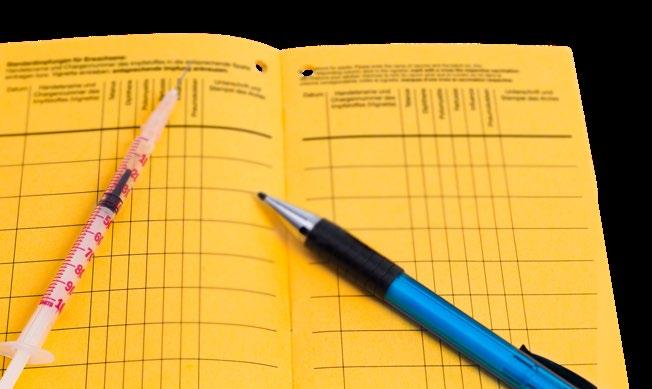
The question of influenza vaccination for healthcare professionals is an urgent and highly relevant one. After all, the devastating impact of influenza is widely recognized, and influenza vaccines are estimated to prevent thousands of admissions and millions of illnesses with current usage. At risk groups are well defined. Health care professionals work with the patients at risk on a daily basis. In Europe, the question of influenza vaccination of healthcare professionals remains a very urgent one. Annual vaccination is widely recommended to reduce the risk of healthcare acquired influenza, yet uptake rates remain dramatically low.
Why is it so difficult to achieve influenza vaccine uptake levels in healthcare workers that would reduce or eliminate the risk of transmitting the disease?

In the 2019 Science Policy Influenza Summit, ESWI attempted to answer that question in close collaboration with its partner organizations. ESWI brought together influenza stakeholders for a day of presentations and discussions. The event was available via live stream video, reaching 342 viewers worldwide.
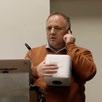

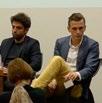
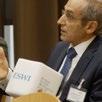
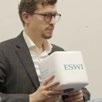

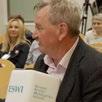
ESWI will continue the discussion of vaccination programs for healthcare workers at the 7th ESWI Influenza Conference in Valencia.
 Videotaped lectures are available on ESWI TV at bit.ly/2uknaK8
Videotaped lectures are available on ESWI TV at bit.ly/2uknaK8
CHAIR: Marc Van Ranst, UNIVERSITY OF LEUVEN AND BELGIAN FLU COMMISSIONER
Marco Goeijenbier, ERASMUS MC ROTTERDAM, THE NETHERLANDS
09:00-09:20 Current recommendations and guidelines for healthcare workers vaccination: an overview
Marc Van Ranst, UNIVERSITY OF LEUVEN AND BELGIAN FLU COMMISSIONER
09:20-09:30 Questions & answers
09:30-09:50 The dangers of flu for at-risk groups and healthcare workers
Ab Osterhaus, RESEARCH CENTER FOR EMERGING INFECTIONS AND ZOONOSES, HANNOVER, GERMANY, AND ESWI CHAIR
09:50-10:00 Questions & answers
10:00-10:20 What are the roles and responsibilities of healthcare workers in preventing nosocomial influenza infections?
George Kassianos NATIONAL IMMUNISATION LEAD ROYAL COLLEGE OF GENERAL PRACTITIONERS, UK, AND ESWI MEMBER
10:20-10:30 Questions & answers
10:30-11:00 COFFEE BREAK
11:00-11:20 Best Practices for Healthcare Worker Immunization
Lydia Crutchfield, ASSOCIATION OF OCCUPATIONAL HEALTH PROFESSIONALS IN HEALTHCARE (AOHP), USA
11:20-11:30 Questions & answers
11:30-11:50
Measuring the impact of a mandatory provincewide vaccinate-or-mask policy on healthcare worker absenteeism in British Columbia, Canada
Michelle Murti, PUBLIC HEALTH PHYSICIAN, COMMUNICABLE DISEASES, EMERGENCY PREPAREDNESS AND RESPONSE, PUBLIC HEALTH ONTARIO
11:50-12:00 Questions & answers
12:00-12:20
Mandatory vaccination for health care workers in the US
Litjen Tan, IMMUNIZATION ACTION COALITION ON THE “INFLUENZA VACCINATION HONOR ROLE” AND INFLUENZA VACCINATION MANDATES OF LEADING MEDICAL ORGANISATIONS IN THE US
12:20-12:30 Questions & answers
12:30-13:30 LUNCH
13:30-14:10
The ethics of influenza vaccination of healthcare workers: a critical appraisal
Pros and cons by Sarah Edwards, DEPARTMENT OF SCIENCE AND TECHNOLOGY STUDIES, UNIVERSITY COLLEGE LONDON, UK and Hanna Nohynek, FINNISH INSTITUTE FOR HEALTH AND WELFARE
14:10-14:30
14:30-15:00
Questions & answers
The role of healthcare professional organizations: Short statements by ESWI coalition partners
• European Respiratory Society (ERS), James Chalmers
• European Society for Paediatric Infectious Diseases (ESPID), Delane Shingadia
• Pharmaceutical Group to the EU (PGEU), Stéphane Pichon
• European Academy of Paediatrics (EAP), Andreas Trobisch
• European Public Health Association (EUPHA), Maria Gańczak
• European Medical Association (EMA), Damiano Cantone
• WHO, Shoshanna Goldin
15:00-15:15
15:15-15:55
COFFEE BREAK
The role of healthcare professional organizationsPart 2
15:55-16:45 Audience Debate: How to establish and implement vaccination programmes for healthcare workers. What needs to be done?
16:45-17:00
Conclusions of the meeting
‘Towards influenza vaccination programmes for Health Care Professionals’
People with diabetes face a higher risk for influenza and its complications and national and international guidelines therefore advise that diabetes patients be annually vaccinated against influenza. The attention for the impact of influenza on diabetes patients, however, is low and so is the vaccine uptake in this group.
In 2018, leading diabetes organizations, healthcare professional organizations and ESWI joined forces to forge an active influenza/ diabetes community, implementing an action plan to better protect people with diabetes against influenza.
The IDC community partners reaffirmed their commitment to the 2018 action plan on
1) including tailored influenza vaccination information in their existing communication channels
2) creating diabetes/influenza awareness raising materials to be shared with members
3) creating and maintaining the dedicated influenza/diabetes section on the ESWI portal website
Building on the 2018 action plan, the IDC community developed a joint IDC community commitment paper.
The members of the Influenza/Diabetes Community commit themselves to developing and implementing a joint strategy
■ to continue raising awareness about the impact of influenza on people with diabetes by plugging the influenza message into their meetings and conferences
■ to disseminate good practices about influenza vaccination in people with diabetes,
■ to convince/encourage health care workers and clinicians treating people with diabetes
■ to lead by example and get vaccinated themselves and
■ to recommend annual influenza vaccination to their patients.
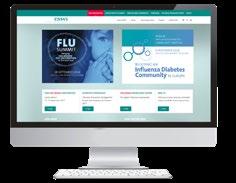
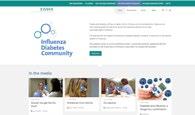


ESWI organised a satellite symposium during the 55th EASD Annual Meeting on September 18, 2019). ESWI members, Marco Goeijenbier and Luc Martinez, presented a scientific programme reviewing current and new data on influenza vaccination of people with diabetes.
This satellite symposium presented a unique opportunity to integrate the topic of influenza vaccination of people with diabetes in a conference of the Influenza/Diabetes Community partners.
GOEIJENBIER:
ESWI had been invited by ESPID to co-organize a satellite symposium during their 37th annual meeting in Ljubljana.
The topic of this joint ESWI/ESPID symposium was “Influenza vaccines for children: current issues and developments” The session was held on May 8, 2019 for an audience of 250 people, mostly paediatricians with an interest in influenza.
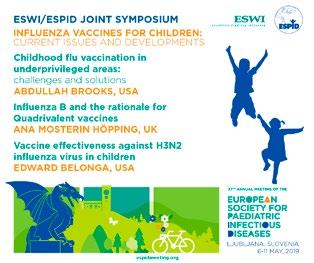
The topics on the agenda were highly scientifc in nature and included presentations on
■ “Influenza B and the rationale for Quadrivalent vaccines”
■ “Childhood flu vaccination in underprivileged areas: challenges and solutions”
■ “Vaccine effectiveness against H3N2 influenza virus in children”
Due to an unexpected high number of qualitative influenza abstracts submitted, the organizers dedicated an entire programme session to influenza.
The Centre on Global Health Security at Chatham House and ESWI organized a stakeholder gathering on influenza pandemic preparedness on 22 January 2019, in commemoration of the centenary of the 1918 influenza pandemic.
The meeting’s programme saw a series of keynote lectures where invited experts provided the scientific basis for the emergence of influenza viruses with pandemic potential and the impact of and the response to past flu pandemics.
Key stakeholders presented their roles in pandemic preparedness, including ECDC, the World Health Organization, the European Commission, national ministries of public health, regulatory authorities and the pharmaceutical industry. Since the meeting’s aim was to foster debate among key players in pandemic preparedness and response, the program was designed to culminate in an extensive stakeholders’ debate.
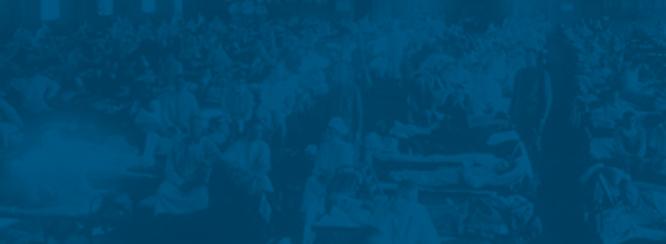
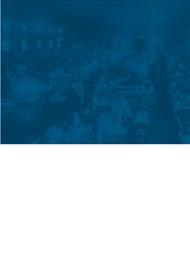
WHO is focused on ensuring that all countries have their own capacity to undertake national risk assessments.
However, it is clear that a WHO headquarters declaration of a pandemic, or PHEIC, would remain crucial for seeding the necessary global response, particularly for making the switch from seasonal to pandemic vaccine manufacturing. Consistent communication from WHO is needed early and often.
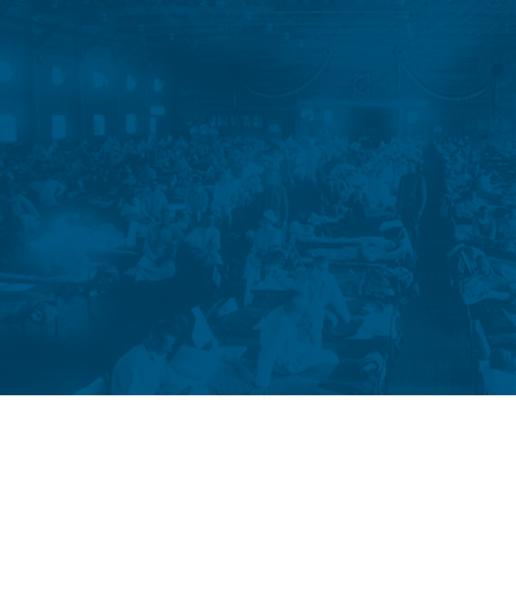
Pandemics must be seen as a civil emergency, not just a health emergency. This is particularly important because political awareness of pandemic influenza has declined considerably since 2009. The UK takes an ‘all of government’ approach to pandemic preparedness; this approach could be replicated in other countries to ensure appropriate preparedness measures are undertaken by all potentially affected sectors, and to improve cross-sector communication and collaboration.
It is essential that research be integrated into pandemic preparedness and response. This research should include monitoring for vaccine immunogenicity and safety, antiviral efficacy, and non-pharmaceutical countermeasures. Main taining pandemic research teams in interpandemic years is difficult but this challenge can be overcome through mul ti-year contracts with clauses that require the prioritization of pandemic research in the case of a pandemic declaration. Pre-approved research projects that can be activated within two to three weeks of a pandemic declaration are also an option. Developing pre-pandemic standards and protocols can help ensure that research data are produced in a timely manner that effectively informs the response; these process es are currently underway through the Platform for European Preparedness Against (Re-)emerging Epidemics (PREPARE).
In the event of a severe pandemic, intensive care unit capacity is likely to fall, as is the availability of hospital beds, and moral/ethical decisions will likely have to be made over aspects such as which patients would be admitted to hospitals and who should the scarce ventilators be used on. Arrangements should be agreed during the inter-pandemic period, involving a wide group of stakeholders (including community representatives, faith groups and judges) in the discussion to ease public acceptance of the resulting strategy. The suggestion was made for countries to appoint a decision-making board that convenes both before a pandemic to plan, as well as during a pandemic to make decisions on such issues.
Pandemic vaccines come too late for countries that can afford them and those that cannot. This raises a need to prioritize the development of a universal influenza vaccine. A number of countries and organizations, including the EU and India, are looking into this.
Joint procurement of vaccines and antivirals provides a way of ensuring that all member states, regardless of size, are treated equally. Negotiations for procurement of pandemic influenza vaccine will be finalized in the next few months.

Since the first edition in 2002, ESWI has been organizing its influenza conferences every three years. Over the past years, they have grown into the largest European scientific conferences entirely dedicated to influenza.
The Seventh ESWI Influenza Conference will be held in Valencia, from 13 to 16 September 2020 and will also invite abstracts on RSV.
ESWI strongly believes influenza and RSV experts should get together to share research and learn from each other.
FROM A CLINICAL PERSPECTIVE
■ Influenza and RSV cause very similar respiratory disease
■ Influenza and RSV hit the extremes of age the hardest (children and the elderly) FROM A PATHOGENESIS PERSPECTIVE
■ Clear overlaps as well as clear differences
■ Resulting in major implications for intervention strategies FROM AN INTERVENTION STRATEGIES PERSPECTIVE (VACCINES, ANTIVIRALS AND BIOLOGICAL RESPONSE MODIFIERS)
■ Intervention strategies for influenza are improving and emerging
■ New intervention strategies for RSV are emerging
■ Prospects for:
■ Combined diagnostics/hospital management strategies
■ Combined vaccination strategies
■ Biological response modifiers: similar pathogeneses resulting in similar approaches
FROM A POLICY PERSPECTIVE
■ Reimbursement policies for both influenza and RSV intervention strategies are crucial
Updates are to be found here: www.influenzaconference.org
IN 2019, ESWI COVERED A LOT OF GROUND.
The call for abstracts and Young Scientist application was launched on October 3. The submission deadline is May 15, 2020.
IN 2019 ESWI ALSO OPENED A CALL FOR THE FIFTH EDITION OF THE PRESTIGIOUS BEST BODY OF WORK AWARD

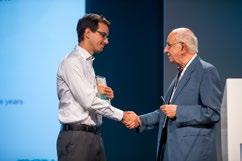
The main goal of the award is to advance research in the influenza field
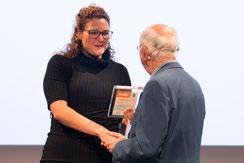
The competition is open to all young scientists throughout the world and will be judged by an international committee spanning all of influenza
The winner will be awarded a prize worth €10,000 as well as a chance to present his/her research at the 7th ESWI Influenza Conference in Valencia in September 2020.
REGISTRATIONS WILL OPEN ON JANUARY 21, 2020
Previous winners are
■ 2009 winner: Gülsah Gabriel
■ 2011 winner: Vincent Munster
■ 2014 winner: Damian Ekiert
■ 2017 winner: Debby van Riel
ESWI continues to create, collect and disseminate relevant scientific content about influenza with three important objectives:
■ to reinforce ESWI’s reputation and increase “brand” awareness
■ to increase interaction with target audiences
■ to promote ESWI events and increase the number of attendees

Visitors of the www.eswi.org portal website can browse through our videos on various influenza topics in ESWI TV, get the information they need from our influenza knowledge center, stay informed about ESWI’s triennial influenza conferences, its symposia and roundtables, and the yearly Influenza Summits.
ESWI is determined to expand and update the content on the portal in order to maintain relevance and authority.
The ESWI portal website also hosts the Influenza/Diabetes community webpages, a dedicated influenza/diabetes section that serves as a virtual reference center on diabetes and influenza
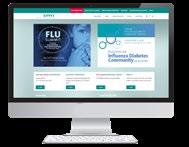
ESWI manages and constantly updates a database of some 8,000 influenza stakeholders worldwide. ESWI is ready to use this platform in any influenza-related educational project, as it is a highly flexible tool to reach the global flu field in just a few clicks. Another tool in ESWI’s web-based communication strategy is its monthly newsletter. The ESWI newsletter FLUZINE offers a selection of influenza-related articles collected from a range of media sources. Fluzine is hence a cost-effective way to enhance ESWI’s visibility in the influenza community.
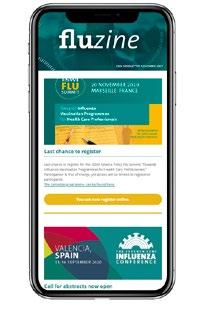

2020 will again be an interesting, busy and fascinating year for ESWI. To realize its aims, however, ESWI fully relies on the loyal and active support of its members, partner organizations and sponsoring companies. Their joint forces are the strength of ESWI, allowing the organization to play its unique role in the influenza field.
If you have any questions about the European Scientific Working group on Influenza, please contact:
 Christel Smeys
Christel Smeys
ESWI management e-mail: christel.smeys@eswi.org